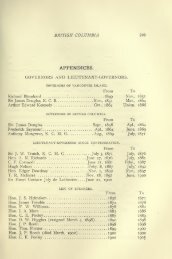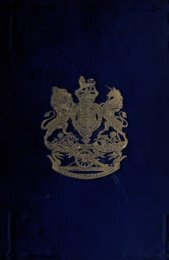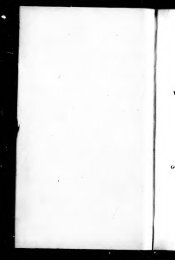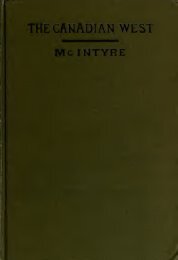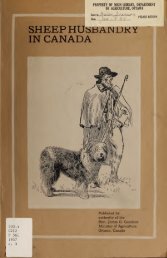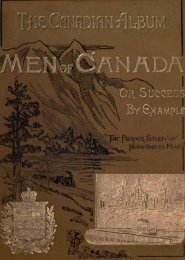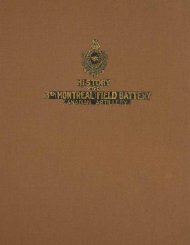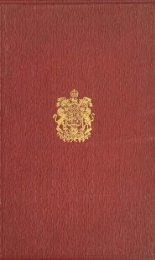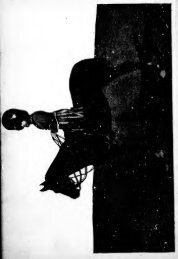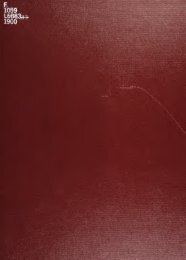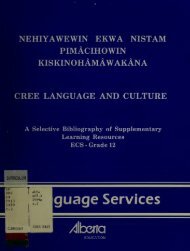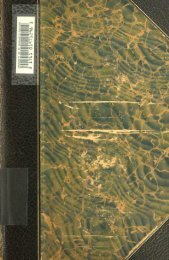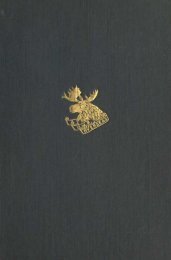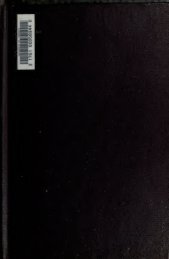Royal Scots of Canada Highlanders - Electric Scotland
Royal Scots of Canada Highlanders - Electric Scotland
Royal Scots of Canada Highlanders - Electric Scotland
You also want an ePaper? Increase the reach of your titles
YUMPU automatically turns print PDFs into web optimized ePapers that Google loves.
lO Sfh ROYAL SCOTS OF CAXADA<br />
Meantime the political troubles in this province had<br />
been developing. The interests <strong>of</strong> the French Canadians<br />
or "The King's new subjects,"<br />
as they came to be known,<br />
clashed more and more with those <strong>of</strong> "The King's old<br />
subjects," or the new English speaking settlers. It was<br />
perhaps hardly to be expected that a thorough understanding<br />
between conquerors and conquered would spontaneously<br />
develop.<br />
Troubles arose among other things as to the validities<br />
<strong>of</strong> the old French militia commissions, some <strong>of</strong> the<br />
old functionaries persisting in performing the fimctions <strong>of</strong><br />
their <strong>of</strong>fices in virtue <strong>of</strong> the army orders providing for<br />
the continuation <strong>of</strong> the old French commissions on the<br />
compliance <strong>of</strong> the holders with the trifling conditions<br />
imposed. An ordinance was consequently proclaimed<br />
November 27, 1765, reading as follows:— "Whereas several<br />
captains <strong>of</strong> the militia former!}^ established in this<br />
province, and afterwards continued until the establishment<br />
<strong>of</strong> Civil Government within the same, pretend<br />
that their commissions and former authority <strong>of</strong><br />
captains<br />
<strong>of</strong> militia still continue and arc in force, notwithstanding<br />
no ordinance <strong>of</strong> His Excellency the Governor in Council<br />
has ever been made for establishing or continuing them<br />
in <strong>of</strong>fice, and whereas the keeping up <strong>of</strong> a militia in this<br />
province at this juncture is not necessary: be it therefore<br />
ordained and declared by the authorities aforesaid that<br />
on the establishment <strong>of</strong> British Civil Government in this<br />
province, the militia before that time established in the<br />
same was thereby abolished and taken away to all interests<br />
and purposes whatsoever, and all power and authority<br />
derived from them, or which any person or persons<br />
whatsoever might claim or pretend to claim bv<br />
force or in virtue <strong>of</strong> any commission or other authority<br />
therein, did thereforeward cease, and was thereby annulled<br />
and taken away, and any person or persons whatsoever<br />
acting or pretending to act under any commission<br />
or authority therein, was and were thereby and by<br />
means there<strong>of</strong> dismissed and discharged from the same<br />
accordingly."<br />
Gradually the former militia <strong>of</strong>ficers were relieved <strong>of</strong><br />
their civil functions as civil magistrates, and other functionaries<br />
were appointed.<br />
The attempts to summarily abolish the established<br />
system <strong>of</strong> government and the jurisprudence <strong>of</strong> the<br />
country, and the substitution therefor <strong>of</strong> a British system<br />
and British laws, might, at the time, have appeared to<br />
the country's new rulers to be not merely expedient but<br />
really humane, but it certainly, for a time, kept cruelly<br />
aggravated the very natural suspicion as to the generous<br />
intentions <strong>of</strong> their conquerors felt by the patient<br />
but high-spirited Canadian people. To interpret the<br />
English laws, and to enforce the English system <strong>of</strong> administration,<br />
English <strong>of</strong>ficials were naturally preferred,<br />
and they were guilty <strong>of</strong> some favoritism to their own<br />
kindred. The French militia <strong>of</strong>ficers and <strong>of</strong>ficial class<br />
generally found themselves deposed and replaced by<br />
strangers. The change was naturally a galling one, and<br />
some <strong>of</strong> the old military element began to agitate for<br />
admission into the British .service. Army <strong>of</strong>ficers were<br />
nothing loth to avail themselves <strong>of</strong> the excellent military<br />
material in the province, and April 4, 1771, Colonel Robertson,<br />
Quartermaster-General, wrote to Colonel Haldimand<br />
from New York about a plan for enrolling two<br />
regiments in <strong>Canada</strong> to be <strong>of</strong>ficered by young Canadians<br />
<strong>of</strong> good family.<br />
In 1773 a memorial was sent to the King by a few<br />
<strong>of</strong> the seigneurs and burgesses claiming a right to participate<br />
in all public employments military and civil.<br />
Actuated by a desire to conciliate the Canadians in<br />
view <strong>of</strong> the revolutionary agitation in the older English<br />
colonies, and in the hope <strong>of</strong> removing all reasonable cause<br />
<strong>of</strong> com])laint, the British House <strong>of</strong> Commons in 1774<br />
passed the Quebec Act, which extended the boundaries<br />
<strong>of</strong> the province from Labrador to the INIississippi, and<br />
from the Ohio to the<br />
watershed <strong>of</strong> Hudson Bay, abolished<br />
Roman Catholic disability, confirmed the tithes to<br />
the Roman Catholic clergy, but exempted Protestants<br />
from pa3'ment, re-established the French civil code and<br />
the se



